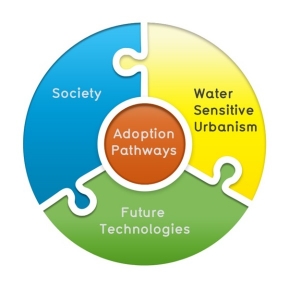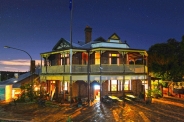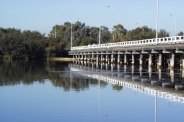Cooperative Research Centre for Water Sensitive Cities
The EMRC is proud to be an inaugural industry partner of the Cooperative Research Centre for Water Sensitive Cities (CRCWSC) and a member of the Western Regional Advisory Panel. Partnership with the CRCWSC ensures that the EMRC and its member Councils have access to the latest research, technology, policy and training in relation to best practice water management such as stormwater management and water sensitive urban design.
The CRCWSC is an Australian Government $120 million inter-disciplinary research centre with research hubs in Brisbane, Melbourne, Perth and Singapore. The CRCWSC was established in July 2012 to help change the way we design, build and manage our cities by valuing the contribution water makes to economic development and growth, to our quality of life, and to the ecosystems of which cities are a part.
The CRCWSC assists government and industry in WA to:
- Support the Research Node at University of Western Australia;
- Support and extend the activities of the existing national CRCWSC research program to ensure applicability to WA conditions; and
- Fund a local capacity building program (New WAter Ways) to ensure extension and adoption of the CRCWSC program outcomes.
Background
In November 2012, the Australian Government announced funding of almost $148 million for world-class collaborative research and innovation under the Australian Government's Cooperative Research Centres (CRC) program. Following on from the Cities as Water Supply Catchments research program, the CRC for Water Sensitive Cities was established with funding to 2021 and is supported by higher education institutions, government and non-government organisations, water utilities and the private sector.
The CRC for Water Sensitive Cities (CRCWSC) brings together the world-renowned subject matter experts and industry leaders to undertake research that will revolutionise water management in Australia and overseas. In collaboration with over 80 research, industry and government partners, the CRCWSC will deliver the socio-technical urban water management solutions, education and training programs, and industry engagement required to make towns and cities water sensitive.
Through an extensive consultation process, participants and stakeholders have identified a number of key challenges to urban water reform required to transform cities into liveable, resilient, sustainable and productive cities. To effectively address the complex inter-dependencies of the many factors influencing water management in cities of the future, the CRCWSC employs an inter-disciplinary delivery approach with teams located at research hubs in Brisbane, Melbourne, Perth, and Singapore.
More information can be found on the CRCWSC website - http://watersensitivecities.org.au/
Program outputs and publications
The new CRCWSC website has a number of ways to access information. One of the ways is through the 'Creating impact for government and industry' page:
watersensitivecities.org.au
Another way to access information is through the CRCWSC extensive resource library which allows access to research and synthesis outputs and other publications.
watersensitivecities.org.au
Publications include:
- Technical / milestone reports - produced regularly as research outputs from the relevant Project Areas and includes guidelines, assessments, technical and policy advice. While some reports are available to the general public, other publications can only be accessed by CRCWSC partners;
- Research synthesis reports - including the ideas series, are aimed at passing on knowledge to allow for research to be used and adopted by industry and end users;
- blueprint series - encourages discussion and innovation in harnessing the potential of stormwater to overcome water shortages, reduce urban temperatures and improve waterway health of Australian cities in their transformation into Water Sensitive Cities;
- Fact sheets - concise summaries of specific research outputs;
- Industry / policy notes - concise summaries of research publications which give industry and the community a taster of the research being conducted on specific projects;
- Formal publications and corporate reports; and
- Journal articles, book chapters, PhD posters, presentations and videos.
Key projects to date with application in Perth's Eastern Region include:
- Biofilters and wetlands for stormwater treatment and harvesting (Project C1.1)
- How influencing behaviours can accelerate the transition to a water sensitive city and the Behaviour Road Map (Project A2.2)
- Impacts of harvesting solutions and water sensitive urban design on evapotranspiration (Project B3.1)
- Designing Rain Gardens (Project A4.1)
- Green Cities and Microclimate (Project B3.1)
- Australian Domestic Water Use Cultures (Project A2.1)
Relevant industry notes include:
- Valuing the restoration of urban drains to livingstreams (Project A1.2)
- Water literacy in Australia (Project A2.3)
- Valuing stormwater management: who is willing to pay? (Project A1.1)
- Strategies for Preparing Robust Business Cases (Synthesis)
Tools and products workshop, July 2016
On 27 July 2016, the EMRC, as an invited Western Regional Advisory Panel representative, attended a workshop in Brisbane to provide input into how Tranche 1 and Tranche 2 activities will meet industry needs and CRCWSC strategic plan outcomes.
The workshop included speakers from a range of current projects and included discussions regarding the importance of incorporating local data, "operationalising" research and data, ensuring data was compatible with existing platforms, identifying the scale and scope of the tools, such as for local government application, and developing "roadmaps" to enable industry and end users to navigate the tools and research to find solutions to local issues.
Integrated Research Project 2 - Integrated Economic Assessment and Business Case Development for Water Sensitive Cities
Integrated Research Project 2 - Integrated Economic Assessment and Business Case Development for Water Sensitive Cities
Integrated Research Project 2 (IRP2) will develop and apply an economic evaluation framework to identify and quantify economic, environmental and community values of investments in water sensitive practices and systems. The ultimate output of the project will be an accepted and well-aligned evaluation framework that users will apply to business case development and decision making at multiple levels in public and private sector organisations.
The framework will help in better decision making to achieve water sensitive, liveable and resilient cities. Building on existing CRC work on economic evaluation and, existing literature (such as studies on customer willingness to pay, water literacy, etc.), the framework will be developed in close engagement with key stakeholders throughout the project. A Project Steering Committee will guide each stage of the project.
Additionally, local government and industry practitioners will be directly involved in developing key inputs and testing of the proposed framework to support the acceptance and ongoing adoption from all key stakeholders across Australia.
The EMRC is a member of the IRP2 Steering Committee and the Shire of Mundaring has been selected as a case study for this project for converting a drain to a living stream at a new development planned for Bellevue.
Water Sensitive Cities Index
The WSC Index is an indicator benchmarking tool that identifies urban water management conditions that create more liveable, sustainable, resilient, and productive urban places, consistent with the concept of water sensitive cities. The Index applies an industry-focused approach to the translation of research into an innovative benchmarking and planning tool for decision makers keen to support the transition to a water sensitive city.
The purpose of the WSC Index is to guide governments, organisations, and communities to transition their cities into liveable, resilient, sustainable, and productive places through water-related actions.
The WSC Index is designed to:
- Benchmark and rank cities based on water sensitivity performance;
- Set targets and track progress;
- Inform management responses to improve water sensitive practices and enable the transition to a water sensitive city; and
- Foster industry collaboration.
Designed in collaboration with industry partners, the WSC Index serves as a product with four core values: useability, functionality, reliability and benefits.
The City of Swan was selected to pilot the Index, one of only two local governments in Australia to trial the tool.
Research Programs
Program A -- Society
This program will focus on understanding and delivering the social transformations needed to support water sensitive cities, including community attitude and behavioural change, governance & economic assessment practices, management systems and technological innovation.
Program B -- Water Sensitive Urbanism
This program will focus on the influence of urban configurations on resource flows across a range of scales. It will apply green infrastructure and climate responsive design principles to water security, flood protection and the ecological health of terrestrial and aquatic landscapes from whole-of-catchment to street level.
Program C -- Future Technologies
This program will develop integrated and multi-functional urban water systems that manage and/or use multiple water sources at a range of scales. It will deliver innovative technologies for: integrative management of the urban water systems; fit-for-purpose production of water; the recovery of energy, nutrients and other valuable materials embedded in urban water; minimising the carbon footprint and ecological impacts of water systems; and maximising the potential multiple beneficial values of urban water services.
Program D -- Adoption Pathways
This program will deliver a suite of capacity building projects and socio-technical modeling tools that will provide a focus for participants and stakeholders at a national regional and community level to interact, experiment, and learn from each other. This in turn will: improve community engagement; enrich educational and training programs at the professional and sub-professional levels; and support the development of robust science-policy partnerships.

For further information please contact:
Julia Christensen - Coordinator Urban Environment
Email: Julia.Christensen@emrc.org.au


